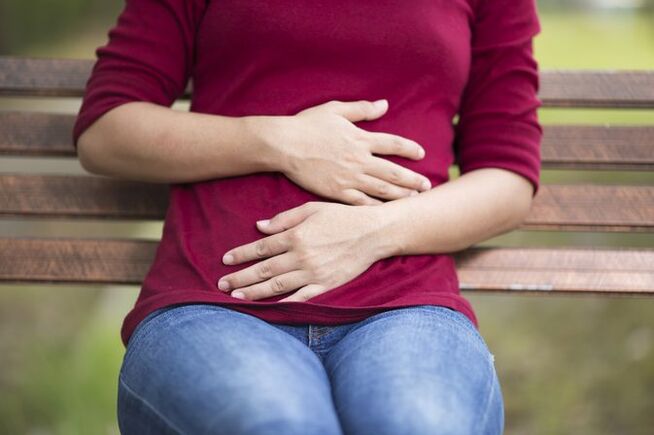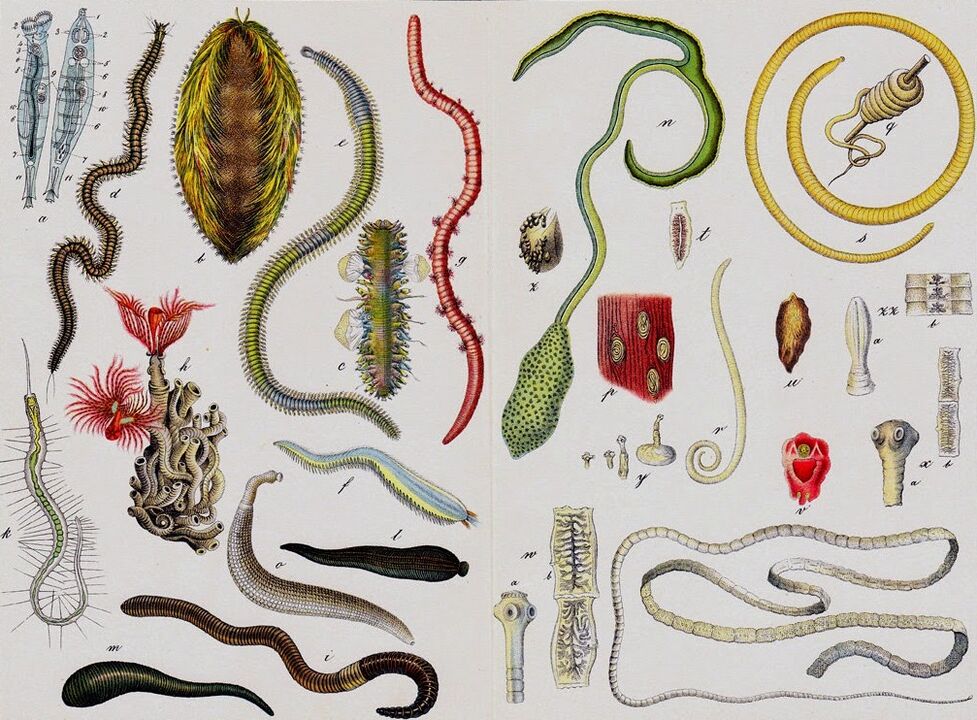An adult’s body is home to a variety of microscopic life partners. Most of them are beneficial and are our symbionts. These include about 500 species of bacteria that live mainly in the gut. However, many forms of life entering the human body begin to parasitize and poison the health of the host.
One type of unwanted neighbors are worms. These are parasitic worms that infect the intestines, liver, lungs and, in rare cases, muscles. All types of parasitic worms are referred to as helminths, and the infection with them is helminthiasis.
To answer the question of how to treat worms, you need to understand how they enter the human body. The main ways of infection are:
- Through the soil, when they become infected with worms that spend part of their life cycle on the ground. Their developing eggs or larvae fall on vegetables and fruits, which are later consumed. Animals infected with worms through the soil are then passed on to humans.
- By contact with an infected person. The larvae can spread through bedding, towels, and other items used by the infected patient. According to statistics, helminths are present in the bodies of 60% of the population, and migrants of Asian descent are a special risk group.
- By consuming contaminated meat or fish. The eggs and larvae of worms are killed when exposed to prolonged high temperatures.
- Sometimes insect bites can be the cause of infection.
Once in the human body, worms actively multiply and release toxic waste products. Their accumulation and increase in number increases the symptoms of malaise. In order to get rid of the parasite, you need to see a doctor and perform the treatment.
Signs of infection caused by worms in adults

The presence of the parasite in the organs can be determined by external signals. These include manifestations of the skin that significantly worsen the condition and cause itching. For example, inflammation, acne, cracked heel, nail layering.
Infection caused by worms has similar symptoms to other diseases. The amplification of the various manifestations depends on the location of the helminth. In addition to skin rashes, intestinal disorders are also common:
- unstable stools;
- specific odor from the mouth, increased gas production;
- nausea;
- itching in the anus;
- weight loss with a parallel increase in appetite.
Parasitic toxins also affect the nervous system, causing headaches and irritability. A significant increase in the number of helminths may lead to memory impairment and depression. The immune system does not recover due to a lack of vitamins and important elements. Man is constantly sick under the influence of viruses and bacteria. Coughing and suffocation may occur if the respiratory system is affected.
If you experience these symptoms, you should see a doctor. Based on the results of the tests and a thorough examination, a specialist will determine the form of the parasite and prescribe drugs.
Types of helminths parasitizing the human body

Treatment of the disease is prescribed depending on the type of parasite established in the internal organs. Various worms affect certain tissues and cause specific symptoms.
The main forms of infection of parasitic worms are distinguished:
- Enterobiasis is caused by pinworms. Small, round organisms are localized in the intestines and cause severe itching of the skin of the anus.
- Trichinella penetrates the muscles through the vascular system. Symptoms appear suddenly and unexpectedly in the form of fever, fever, swelling of the eyelids and face.
- Vlasoglavy belongs to the nematodes and affects the colon. Signs of the disease are mild or absent. Dizziness, abdominal pain, appendicitis may occur.
- Defeat different types of tapeworms. These include bovine tapeworms, broad tapeworms, porcine tapeworms. Parasites live in the intestines, differing in a ribbon-like body, divided into many small parts. Symptoms include dizziness, abdominal pain, and stool problems.
These forms of invasion are most often caused by non-compliance with personal hygiene and the consumption of poorly fried meat. Pets are also sources of the spread of the parasite.
If the patient shows symptoms of a worm infection, the doctor will confirm the diagnosis using laboratory tests. Most commonly, feces are examined for the presence of helminth eggs and an enzymatic immunoassay is performed. In addition, anus scraping, endoscopy, and ultrasound can be studied.
Medicines needed to treat worms
If helminths are found in the human body, the doctor will prescribe medication. Many people turn to traditional medicine to get rid of the disease. It is possible to use a combination treatment, but its effectiveness will be checked by a specialist.
The presence of worms in the internal organs is not a dangerous diagnosis if the disease is identified in time and medication is prescribed. Their effect is to kill the parasite that is poisoning the infected body. After the helminth samples and their metabolites are removed, human health is restored.
Due to the need to control the parasite, the composition of the drugs contains ingredients that affect the absorption of nutrients. Lack of nutrition and reproductive conditions leads to the death of worms.
Depending on the type of effect on the worms, the drugs can be divided into the following types:
- The active ingredients block the nervous and muscular systems of the worms. They develop paralysis, are unable to adhere to the intestinal wall and are eliminated from the body.
- The drug interferes with the oxidative processes of glucose in the body of the parasite, causing its death.
- Drugs that inhibit cell tubulin formation and ATP synthesis.
- Medicines that affect the intestinal tract of the intestinal worm.
- Ingredients that destroy the shells of worms. They are exposed to calcium and are digested by the human intestinal tract.
There are drugs that have a wide range of effects and are directed against certain types of helminths. The choice of medicine is made by your doctor based on your tests, the severity of your symptoms and how you are treated. In addition, the possible contraindications to the use of the drug are taken into account.
In addition, funds are prescribed to eliminate the occurrence of allergic reactions to parasitic toxins. Taking these tablets reduces the amount of poisoning with the waste products of the worms and relieves the symptoms of the disease. The additional components are used individually for the course of the helminthiasis complex.
Atypical methods of treating helminthiasis

The use of drugs is particularly effective in the fight against worms. The only disadvantage of drugs is the contraindications. Non-pharmacological treatment is used in such situations:
- Ayurveda;
- oxygen exposure;
- alcohol treatment.
The Ayurvedic system of Indian medicine raises the overall tone of the body, restores vitality and helps in the fight against intestinal worms. According to this teaching, the cause of worm infection is a lack of respect for personal hygiene and the purity of thoughts. Special exercises are used to maintain health and laxatives. Herbs combined with spicy spices cleanse the body of toxins. Successfully used thyme, wormwood, St. John's wort with a week break in the course.
The essence of oxygen treatment is to saturate the cells of the gastrointestinal tract with a suitable gas. To do this, a tube is placed in the esophagus and oxygen is pumped through it. The procedure is repeated for several days. Ozone therapy is also used to kill worms. The tube is inserted into the anus by this method. Through this, an ozone-oxygen mixture is transported, which paralyzes the helminth samples. Sometimes olive oil and ozone enema are used.
Alcoholic beverages are used as a component of treatment. Mix the cognac and tea in equal amounts and then drink on an empty stomach with a laxative. Cognac is used as an independent medicine for one tablespoon for five days. It destroys the vodka infusion of helminths with garlic for 10 days.
Traditional medicine methods for treating worms

The variety of folk remedies allows you to choose the best for each infection. The natural ingredients that affect parasites are:
- Combined with pumpkin and flaxseed laxatives.
- Infusions of wormwood, pomegranate.
- Phytoncides of garlic and onions.
- Ginger root with sugar.
- Dried cloves, ground in a coffee grinder.
- Enema with castor oil and baking soda.
The choice of recipe depends on the type of helminths that live in the body. Based on the test results, the parasitologist selects the optimal combination of different treatment methods.
Ways to control worms
Maintaining health in all situations is possible by following personal hygiene rules. Wash your hands with soap and water after visiting public places and traveling on public transport. The cleanliness of the underwear should be monitored and the accumulation of dirt under the nails should be prevented.

Pets should be dewormed every six months. After contact with stray dogs and cats, it is important to clean the hand surface with antibacterial soap.
Vegetables, fruits and herbs should be eaten thoroughly. Meat and fish should be treated at high temperatures for at least 40 minutes.
Following these recommendations will help prevent infection and subsequent treatment.



























